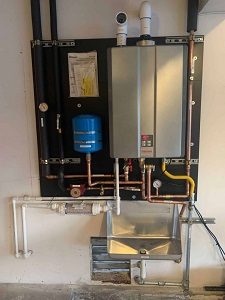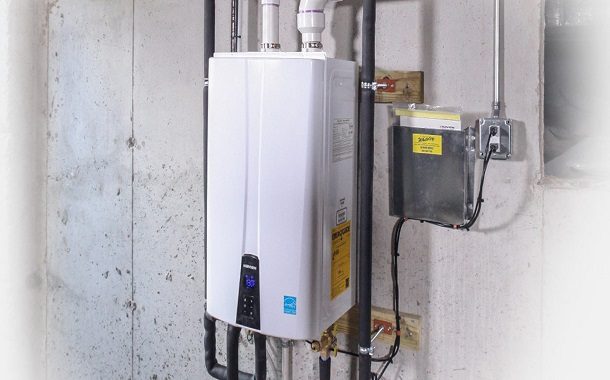Tankless Water Heater Installation Costs
Last Updated on December 27, 2023
Written by CPA Alec Pow | Content Reviewed by ![]() CFA Alexander Popinker
CFA Alexander Popinker
Tankless water heaters provide hot water on demand, eliminating bulky and inconvenient storage tanks and saving energy at the same time.
Unlike conventional water heaters, which can keep 40 to 50 liters of hot water ready at all times, tankless water heaters save energy by producing hot water only when needed. Tankless water heaters can actually be 24 to 34 percent more efficient than a traditional water heater, depending on a home’s daily hot water demand, according to the US Office of Energy Efficiency and Renewable Energy website.
How much does tankless water heater installation cost?
The cost of tankless water heater installation is affected by several factors, but one of the most important ones is the type of fuel required. For instance, natural gas and electric models are the cheapest because they are the most popular. On the other hand, the installation of fuel oil systems and solar, tankless systems costs around $1,100 or even more.
When talking about the costs of tankless water heater installation, we should consider labor costs which are anywhere between $100 and $1,200, and the cost of materials which would be $450 to $1,600. This brings the cost to a total of $950 to $2,800, as you can see in the table below.
| Item | Cost |
| Tankless Water Heater Unit | $500-$1,250 |
| Optional Gas Line Installation/Replacement | $550 |
| Installation Labor | $100-$1,300 |
| Total Average Installation Cost | $500-$3,100 |
Costs considerations
You may need to hire a carpenter or a handyman if it is necessary to create access panels or if the drywall has to be removed. This will result in additional expenses.
You might also like our articles on the cost of a normal water heater installation, a water meter, or repairing a boiler.
The standard installation costs will not include expenses with other materials, including the pipes and heat pumps.
Also, the taxes and permit fees are not included.
There are three main types of fuel for a tankless water heater: natural gas, propane, and electricity. Gas models run at a higher wattage than electric models, heating more water to the ideal temperature for less cost. The downside is that the initial cost of a tankless gas water heater is about $1,000 more than an electric heater. Installation is usually more complex as well.
Natural gas usually costs less than propane or electricity, and in many homes, it can be connected directly. This style of tankless water heater is a great long-term investment because the lower cost of natural gas can eventually offset the higher cost of the unit. Natural gas is also a good choice for households with high demand.
Electric tankless water heaters are an affordable choice, both in terms of initial purchase and installation. However, if the current electrical system does not meet the manufacturer’s specifications, an expensive electrical system upgrade may be necessary.
Propane gas is the most expensive and often cannot be piped into a home. Instead, a tankless water heater that runs on propane is typically powered by a portable fuel tank positioned right next to the water heater. The tank must be replaced when empty, making propane tankless water heaters somewhat impractical for home use, but perfect for recreational vehicle use.
Important things to consider
 Before purchasing a tankless water heater, you will need to determine your hot water usage, which is measured in gallons per minute (GPM) and determine your maximum hot water demand. A typical shower requires about 2.5 GPM; dishwashers, washing machines, and other appliances impose additional requirements for the production of hot water. Therefore, if you have several people showering or several appliances using hot water at the same time, you will need a larger water heater that delivers more gallons per minute.
Before purchasing a tankless water heater, you will need to determine your hot water usage, which is measured in gallons per minute (GPM) and determine your maximum hot water demand. A typical shower requires about 2.5 GPM; dishwashers, washing machines, and other appliances impose additional requirements for the production of hot water. Therefore, if you have several people showering or several appliances using hot water at the same time, you will need a larger water heater that delivers more gallons per minute.
A tankless water heater will last about 20 years, compared to a conventional water heater which will last 10 to 15 years. The average energy savings and extra lifespan make tankless heaters a viable option for many homes. Additionally, many state and local utilities offer rebates and incentives for converting to energy-saving appliances, which can help lower the cost of installing a tankless system.
DIY considerations
If you choose to install the tankless water heater system by yourself, you may be able to save a lot of money on labor costs. But you will need the right skills and knowledge to perform this job.
Before choosing to install the tankless water heater by yourself, make sure that you don’t need any major reconfiguration of the overall system.
Even though you will be able to install the system yourself, you will need to schedule periodic maintenance with a maintenance company or a plumber.


Leave a Reply
Want to join the discussion?Feel free to contribute!